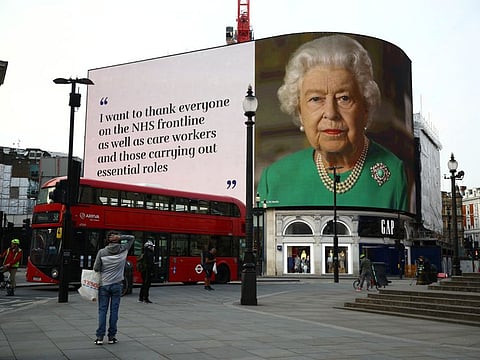Covid-19: Why the UK is stuck for words
Absence of a written constitution in UK is a fundamental flaw in its political system

The sudden incapacitation of British Prime Minister Boris Johnson with severe coronavirus has once again exposed a fundamental flaw in the system of governance that binds the United Kingdom together.
It has no written constitution.
With Johnson lying in an intensive care unit of St Thomas’ Hospital on the south bank of the River Thames, with obvious concerns for the recovery of the prime minister, the next question to be naturally asked is ‘who is in charge?’
The UK system of government — indeed parliament itself which is held by many as being the mother of all parliaments — is based on creaking foundation of rules and precedents
Dominic Raab, the Foreign Secretary, had been called by Johnson, we are told, to inform him that he should take whatever decisions are necessary while acting in the capacity of prime minister. But that is not to say he is actually the deputy prime minister.
Johnson had never formally appointed one, preferring instead to keep his senior Conservative party colleagues at the Cabinet table on their toes and courting his favour.
The logic presumably is that if you nominate a deputy prime minister, you are naturally anointing and heir apparent.
For Johnson, fresh off a stunning electoral victory in December and with the UK now firmly out of the European Union (EU) and winding down the clock on its transition year, he presumably felt there was no need to elevate a potential rival down the road to a position.
Now, by default, Raab has been selected as effectively first among equals.
But the reality is that this confusion at a time of national crisis and international pandemic, the failure in the UK’s political system to have a clear line of authority and succession is a weakness.
The UK is one of five world powers with a nuclear arsenal, and had four nuclear submarines on patrol in the waters of the world armed with enough nuclear warheads to vaporise half of the planet — and then some.
Hypothetically, does Raab have the authority to use those nuclear codes should a situation arise where the UK’s safety is under imminent threat for a well-armed and evilly intentioned foreign power?
Spelling out clear division of powers
On the other side of the Atlantic, the Founding Fathers of the United States went to great lengths and pains to write everything down, spelling out the clear division of powers between the executive, congressional and judicial branches.
And the augments that framework with the Bill of Rights, setting out powers and freedoms that still are pertinent today.
That’s why, for example, Americans can be armed to the teeth with enough firepower to host a mini civil war — or kill dozens at a time in mass shootings — based on their Bill of Rights powers to bear arms.
Across Europe, the influence of both the French Revolution and Napoleon have resulted in codified laws and written constitutions. Around the world, a national rule book or governmental and civil rights framework is the fundamental pillar of the application of power.
And when new leaders come to power through election or revolution, the first course of action may indeed be to change that framework — to suit their own ends.
Think Russia now and its change of presidential rules, Bolivia after the departure of Eva Morales, or Hungary, where the written framework of governance has essentially been passed through a paper shredder by the edicts of Prime Minister Viktor Orban.
Ironically enough, it was as a result of Johnson’s actions some seven months ago when Brexit was still up in the air, that the issue of a written UK Constitution became pressing.
Using the powers that have traditionally emanated from his office, Johnson made the decision in early September to ask the monarch to prorogue — or suspend — parliament from sitting.
It was seen at the time by critics as an attempt to stymie debate on Brexit. Those critics and opposition parliamentarians began a series of court actions against the prime minister, a process that ultimately found that Johnson had misled them — and by extension Queen Elizabeth — in his reasons for the prorogation.
It was recalled and Johnson humbled. It’s important to note, however, that his actions were deemed to be unlawful, not unconstitutional.
A fanciful episode
If the issue of an unwritten constitution became pressing during that episode, it was already placed firmly on the table itself as a result of the Brexit referendum.
The principle of parliamentary sovereignty, whereby the people’s will is expressed through the actions of its elected representatives at Westminster, used to be sacrosanct.
It’s ironic that Johnson himself again had no small part to play in how that whole fanciful episode actually turned out — but it perhaps explains his apostolic drive in ensuring that the people’s will as expressed in the referendum should be carried out.
Today, the UK system of government — indeed parliament itself which is held by many as being the mother of all parliaments — is based on creaking foundation of rules and precedents.
Rules and precedents? Right now, this coronavirus pandemic is unprecedented itself. It has waived many rules too. Let’s hope Johnson makes a speedy recovery — and soon.



